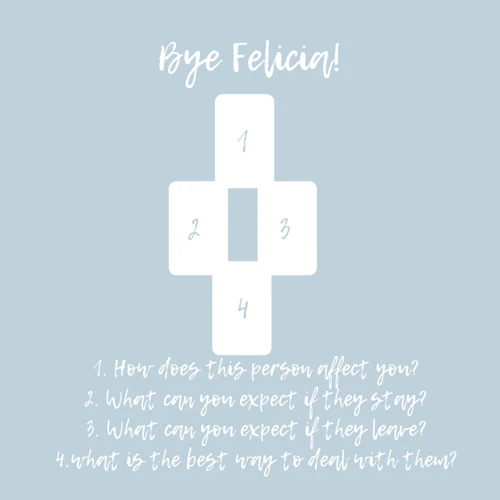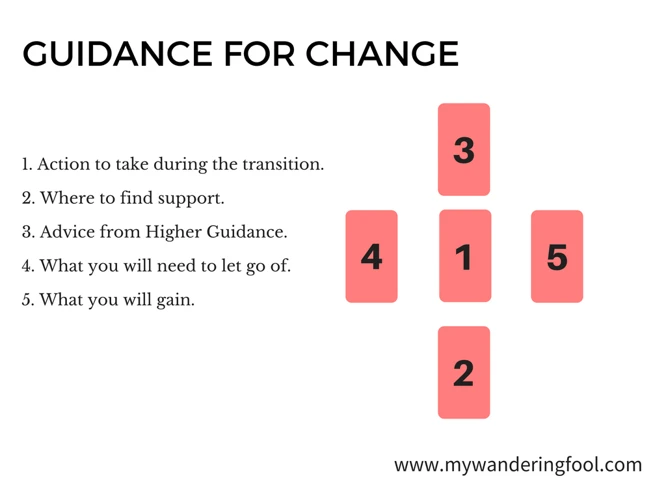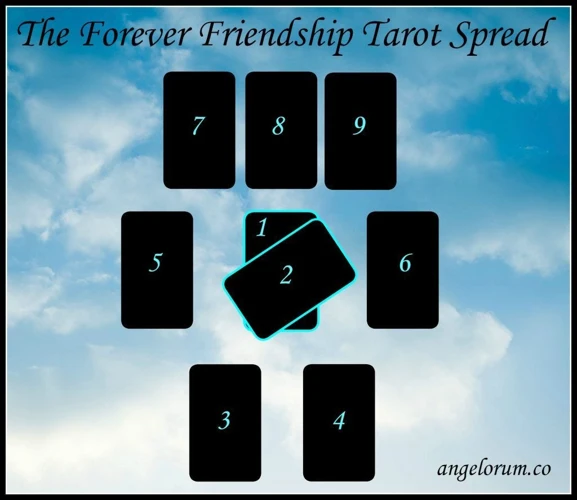Navigating toxic friendships can be an emotionally challenging experience, leaving us feeling drained, disheartened, and unsure of how to move forward. It’s crucial to recognize the signs of a toxic friendship and understand the harmful effects it can have on our well-being. In times like these, seeking guidance from tarot cards can provide valuable insights and help us make informed decisions. By choosing the right tarot deck, preparing for a reading, and utilizing specific tarot spreads, we can gain clarity and understanding about our toxic friendships. Additionally, certain tarot cards can shed light on the dynamics and behaviors present in these relationships, empowering us to heal, set boundaries, practice self-care, seek support, and ultimately move towards a healthier and more fulfilling life. In this article, we will explore how tarot guidance can assist us in dealing with toxic friendships, providing step-by-step advice and practical tips along the way.
Contents
- Understanding Toxic Friendships
- Using Tarot for Guidance
- Tarot Cards for Toxic Friendships
- Healing and Moving On
- Conclusion
-
Frequently Asked Questions
- What are the signs of a toxic friendship?
- How can toxic friendships affect our well-being?
- Can tarot cards provide guidance in dealing with toxic friendships?
- How do I choose the right tarot deck for guidance on toxic friendships?
- What steps should I take to prepare for a tarot reading focused on toxic friendships?
- Are there specific tarot spreads for exploring toxic friendships?
- Can tarot cards be interpreted remotely?
- Which tarot cards should I pay attention to when dealing with toxic friendships?
- How can I set healthy boundaries in a toxic friendship?
- What are some self-care practices to help heal from toxic friendships?
- References
Understanding Toxic Friendships

Understanding toxic friendships is crucial for our emotional well-being and personal growth. By recognizing toxic behaviors, we can protect ourselves from further harm and make informed decisions about these relationships. Toxic behaviors can manifest in various ways, such as manipulation, constant criticism, jealousy, or a lack of respect and support. These behaviors can have detrimental effects on our self-esteem, mental health, and overall happiness. It is important to be aware of the red flags that indicate a toxic friendship, as they can be subtle and easily overlooked. Exploring the role of trust in tarot and friendships can also provide valuable insights into the dynamics of these relationships. Tarot can serve as an art form that helps us uncover hidden truths and gain clarity about our friendships. It empowers us to take control of our lives and make choices that are aligned with our values and well-being. With the help of tarot, we can navigate toxic friendships and find the strength to create healthier and more fulfilling connections.
Link: /tarot-friendship-red-flags/
Recognizing Toxic Behaviors
Recognizing toxic behaviors in friendships is essential for our well-being. Here are some key indicators that can help us identify toxic behaviors that may be present in our friendships:
1. Constant Criticism: Toxic friends often criticize and belittle us, eroding our self-esteem. They may make hurtful comments about our appearance, abilities, or choices, leaving us feeling devalued and insecure.
2. Manipulation: Toxic friends may use manipulation tactics to control and influence us. They may guilt-trip us, play mind games, or exploit our vulnerabilities for their own gain.
3. Lack of Support: Healthy friendships are characterized by mutual support and encouragement. However, toxic friends may dismiss our achievements, undermine our goals, or fail to provide the emotional support we need.
4. Jealousy: Toxic friends may exhibit excessive jealousy, particularly when we experience success or happiness. They may try to sabotage our achievements or constantly compare themselves to us, creating a toxic and competitive dynamic.
5. Boundary Violations: Toxic friends often disregard our boundaries and personal space. They may intrude on our privacy, constantly demand our time and attention, or push us to engage in activities that make us uncomfortable.
6. Constant Drama: Toxic friendships are often filled with drama and turmoil. These friends may thrive on conflict, gossip, and negativity, leaving us drained and emotionally exhausted.
Recognizing these toxic behaviors is the first step towards creating healthier and more fulfilling relationships. By addressing these issues, setting boundaries, and seeking support, we can create a positive and nurturing social circle.
Link: /tarot-friendship-art/
Effects of Toxic Friendships
Toxic friendships can have profound effects on our overall well-being and mental health. These detrimental effects can manifest in various aspects of our lives, impacting our emotional state, self-esteem, and personal growth. One of the primary effects of toxic friendships is the constant feeling of being drained and emotionally exhausted. Toxic individuals often thrive on negativity, and their toxicity can seep into our lives, leaving us feeling emotionally depleted and overwhelmed.
Additionally, toxic friendships can significantly impact our self-esteem. Constant criticism, belittling, or manipulation from toxic friends can slowly erode our self-confidence and sense of self-worth. We may begin to doubt our abilities, second-guess our decisions, and feel a constant need for validation from others.
Toxic friendships can hinder our personal growth and prevent us from reaching our full potential. Toxic individuals may discourage us from pursuing our passions, manipulate us into conforming to their expectations, or undermine our goals and aspirations. Their negative influence can hinder our progress, leaving us feeling stuck and unfulfilled.
The effects of toxic friendships can also extend beyond our emotional well-being to impact our physical health. The constant stress and negativity associated with these relationships can lead to increased levels of anxiety, depression, and even physical ailments such as headaches or digestive issues.
In order to truly thrive and live a fulfilling life, it is crucial to recognize the effects of toxic friendships and take steps to distance ourselves from these harmful dynamics. Seeking guidance from tarot can be a valuable tool in this process, as tarot can provide insights and clarity on the best course of action to protect ourselves and foster healthier connections.
Link: /role-of-trust-in-tarot-and-friendships/
Using Tarot for Guidance

Using tarot for guidance in dealing with toxic friendships can be a powerful tool for self-reflection and decision-making. The first step is to choose the right tarot deck that resonates with you and your intentions. Whether you prefer traditional Rider-Waite symbolism or a more modern deck, selecting a deck that speaks to your intuition is essential. Before starting a tarot reading, it’s important to prepare yourself mentally and emotionally. Find a quiet and comfortable space where you can focus, and consider cleansing your tarot deck with a ritual that aligns with your personal beliefs. When it comes to tarot spreads for toxic friendships, there are various options to explore. A simple three-card spread, focusing on the past, present, and future of the friendship, can provide valuable insights. Alternatively, a more complex spread like the Celtic Cross can offer a more in-depth understanding of the dynamics at play. If you can’t meet with a tarot reader in person, remote readings can be just as effective. Interpreting tarot cards remotely may require a bit more intuition and reflection, but it can still offer valuable guidance. By utilizing tarot for guidance, we can gain clarity, reassurance, and the confidence to navigate the complexities of toxic friendships.
unordered list:
- Choose the right tarot deck that resonates with you
- Prepare mentally and emotionally for the tarot reading
- Consider different tarot spreads for toxic friendships
- Explore remote tarot readings if meeting in person is not possible
- Utilize tarot for gaining clarity and guidance in navigating toxic friendships
Choosing the Right Tarot Deck
When it comes to choosing the right tarot deck, there are several factors to consider that can enhance your tarot reading experience and align with your personal preferences. Firstly, it’s important to connect with the imagery and symbolism of the deck. Different decks have varying art styles and themes, ranging from traditional to modern, fantasy to nature-inspired. Exploring different decks through online galleries or in-person can help you determine which resonates with you the most. Secondly, consider the deck’s structure. Some decks follow the traditional Rider-Waite-Smith system, while others may have their own unique interpretations. Think about whether you prefer a deck with detailed imagery or one that is more minimalist. Additionally, the size of the deck is a practical consideration. Standard-sized decks are readily available, but if you have smaller hands or prefer portability, you may opt for a more compact deck. Another aspect to consider is the accompanying guidebook. Many tarot decks come with guidebooks that provide interpretations and insights into the cards. Assess the clarity and depth of the guidebook as it can greatly support your understanding of the cards. Lastly, trust your intuition. Allow yourself to be drawn to a deck that feels right for you, even if it goes against popular opinion. Remember, the tarot deck you choose should serve as a tool for self-reflection and guidance, so finding one that resonates with you is key.
- Connect with the imagery and symbolism of the deck
- Consider the deck’s structure and art style
- Think about the size of the deck for practicality
- Assess the quality and depth of the accompanying guidebook
- Trust your intuition and choose a deck that resonates with you
Preparing for a Tarot Reading
Preparing for a tarot reading is essential to ensure that you have a focused and productive session. Start by finding a calm and quiet space where you can be free from distractions. Clearing your mind and setting your intention for the reading is key. Take a few moments to breathe deeply and center yourself. You may choose to meditate or engage in a grounding exercise to enhance your connection to the cards. It is also helpful to have a specific question or area of focus in mind. This brings clarity to your reading and allows the cards to provide more precise guidance. Make sure your tarot deck is shuffled and ready for use. Some readers like to set the mood by lighting candles or burning incense. Having a journal or notebook nearby is beneficial to jot down any insights or reflections that come up during the reading. Remember, tarot is a tool that works best when approached with an open mind and a willingness to engage with the messages it offers. By taking the time to prepare for your tarot reading, you create an atmosphere that is conducive to receiving accurate and valuable guidance.
Link: /tarot-friendship-art/
Tarot Spreads for Toxic Friendships
Tarot spreads are an effective tool for gaining deeper insights into our toxic friendships and finding guidance on how to navigate them. When it comes to toxic friendships, certain tarot spreads can help us explore different aspects of the relationship and uncover patterns or dynamics that may be contributing to the toxicity. One powerful spread for toxic friendships is the “Root of the Issue” spread. This spread consists of three cards: the first card represents the root cause of the toxicity, the second card signifies the impact it has on us, and the third card offers guidance on how to address the issue. Another helpful spread is the “Healing and Moving On” spread, which focuses on our own healing and growth. This spread typically includes four cards: the first card represents the lessons we have learned, the second card signifies the areas in which we need to heal, the third card offers advice on self-care practices, and the fourth card guides us on how to move forward. Additionally, the “Advice from the Tarot” spread can provide us with guidance and clarity on how to handle toxic friendships. This spread involves drawing three cards: the first card represents the advice from the tarot, the second card offers insight into what we need to let go of, and the third card reveals what we should embrace in our lives instead. By utilizing these tarot spreads specifically designed for toxic friendships, we can gain a deeper understanding of the dynamics at play and find guidance on the steps we need to take for healing and growth.
Link: /tarot-friendship-art/
Interpreting Tarot Cards Remotely
When it comes to interpreting tarot cards remotely, there are a few important considerations to keep in mind. First, ensure that you have a quiet and comfortable space where you can focus and connect with the energy of the cards. It’s also essential to have a reliable and intuitive tarot deck that resonates with you. Before beginning the reading, take a moment to ground yourself and set your intention for gaining insights into your toxic friendships.
Using technology to conduct remote tarot readings is becoming increasingly popular. Whether you choose to use video calls, instant messaging, or email, it’s crucial to establish clear communication with the querent. Clearly explain the process and encourage them to provide the necessary information or ask specific questions related to their toxic friendships.
When interpreting the tarot cards remotely, pay attention to both the individual card meanings and the overall intuitive message they convey. Look for patterns, connections, and recurring themes in the cards. Take note of any strong sensations, emotions, or intuitive insights that arise during the reading.
To assist with interpretation, keep a journal to track the cards you pulled, the layout or spread used, and the meaning you ascribe to each card. This will help you identify patterns over time and deepen your understanding of the cards’ messages.
Remember that interpreting tarot cards remotely requires a heightened sense of intuition and trust in your connection with the cards. Practice regularly, meditate, and cultivate your intuition to enhance your tarot reading skills and ability to provide guidance for dealing with toxic friendships.
Interpreting tarot cards remotely allows for flexibility and accessibility, making it a valuable tool for seeking guidance and insights into our toxic friendships. Embrace the unique aspects of remote readings and trust in the power of the tarot to illuminate your path towards healing and healthier connections.
Tarot Cards for Toxic Friendships

When it comes to dealing with toxic friendships, tarot cards can be powerful tools for guidance. Certain tarot cards hold symbolic meanings that can bring clarity and understanding to the dynamics of these relationships. The Tower card, for example, represents sudden and drastic change, which can signify the need for breaking free from toxic patterns and destructive behaviors. The Devil card symbolizes the grip of unhealthy attachments and can remind us of the importance of freeing ourselves from toxic influences. The Five of Swords indicates conflict and manipulation, urging us to be mindful of the power dynamics present in our friendships. Lastly, the Ten of Swords signifies betrayal and the need to let go of toxic connections that no longer serve us. By incorporating these tarot cards into our readings, we can gain valuable insights, reflect on our experiences, and ultimately move towards healing and growth.
List of Tarot Cards for Toxic Friendships:
- The Tower
- The Devil
- The Five of Swords
- The Ten of Swords
The Tower
The Tower is a profound and intense tarot card that holds significant meaning when dealing with toxic friendships. As one of the major arcana cards, it symbolizes sudden upheaval, destruction, and chaos. When this card appears in a reading, it suggests that the foundation of the friendship is unstable and needs to crumble in order to rebuild something stronger and healthier. It represents a wake-up call, urging us to confront the toxic dynamics and behaviors within the friendship that have caused harm and distress. The Tower encourages us to release attachments to toxic friendships and embrace necessary change, even if it feels uncomfortable or painful in the moment. It serves as a reminder that sometimes breaking free from toxic relationships is essential for our growth and well-being. The Tower offers an opportunity for transformation and liberation, showing us that we have the strength to rebuild our lives and attract healthier and more supportive connections. Embracing the energy of The Tower can be both liberating and empowering, leading us towards a brighter and more fulfilling future.
The Tower tarot card signifies the necessary destruction of toxic friendships in order to initiate a positive transformation in our lives. It encourages us to let go of what no longer serves us and embrace change for our own well-being.
The Devil
The Devil tarot card serves as a powerful representation of toxic friendships and the negative patterns that can emerge within them. When this card appears in a reading, it signifies the presence of manipulative behavior, control issues, and unhealthy attachments. It is a reminder to examine the dynamics of the friendship and question whether it is truly serving our highest good. The Devil card warns against allowing ourselves to be trapped in toxic patterns, urging us to break free from the chains that bind us. It reminds us that we have the power to release ourselves from unhealthy relationships and reclaim our autonomy. This card serves as a wake-up call, prompting us to assess the extent to which we are willing to sacrifice our well-being for the sake of maintaining a toxic friendship. When encountering the Devil card in a tarot reading, it is essential to take a step back, reflect on our values and boundaries, and make the necessary changes to create a healthier and more supportive social circle. The Devil card teaches us that true liberation comes from recognizing our worth and choosing relationships that uplift and inspire us.
Within the context of toxic friendships, The Devil card can be interpreted as a call to action. It encourages us to confront the toxic behaviors present in the relationship and take the necessary steps to protect ourselves. This may involve setting clear boundaries, speaking up for ourselves, or even ending the friendship altogether. The Devil card reminds us that we hold the power to break free from negative influences and create a more positive and fulfilling social environment. It serves as a reminder that we deserve to be in relationships that nourish our souls and support our growth. Embracing the energy of The Devil card can empower us to let go of toxic friendships and embrace healthier connections that bring us joy and fulfillment.
The Five of Swords
The Five of Swords tarot card symbolizes conflict, manipulation, and betrayal in the context of toxic friendships. This card often represents a situation where one person is triumphing over others at their expense. It signifies an imbalance of power and a win-at-all-costs mentality. When this card appears in a reading, it serves as a warning sign that there may be deceitful and harmful behaviors present in the friendship. It urges us to reevaluate the relationship and consider whether it is truly serving our best interests. The Five of Swords reminds us to be cautious and mindful of our boundaries, as well as the impact toxic friendships can have on our emotional well-being. It prompts us to question our involvement in such relationships and encourages us to take steps towards protecting ourselves and seeking healthier connections. By acknowledging the warning signs represented by the Five of Swords, we can gain the clarity and courage needed to address the toxic dynamics in our friendships and move towards healing and personal growth.
The Ten of Swords
The Ten of Swords in tarot is often depicted as a powerful and intense card that symbolizes the end of a challenging and painful chapter. When it comes to toxic friendships, the Ten of Swords serves as a reminder that sometimes it is necessary to let go and release ourselves from the grip of negativity. It represents the culmination of hurtful experiences and the exhaustion that can arise from enduring toxic dynamics. This card encourages us to acknowledge the pain and betrayal we may have experienced in the friendship, but also serves as a beacon of hope, reminding us that healing and transformation are possible. The image of a figure lying face down with ten swords piercing their back may seem bleak, but it signifies the death of these toxic patterns, allowing space for new beginnings and growth. The Ten of Swords encourages us to embrace the process of letting go and surrendering to the inevitable end of the toxic friendship. It urges us to focus on self-care, rebuilding our lives, and moving forward with renewed strength and resilience. Despite the pain associated with this card, it offers liberation and the opportunity to create healthier and more nurturing connections in the future.
Healing and Moving On
Healing and moving on from toxic friendships is a crucial step towards reclaiming our happiness and well-being. Setting boundaries is an essential part of this journey. By clearly communicating our needs and limits, we establish healthy boundaries that protect us from further harm. Self-care practices play a vital role in the healing process. Engaging in activities that bring us joy, practicing mindfulness and self-reflection, and prioritizing our mental and physical well-being can help restore balance and foster personal growth. Seeking support from trusted friends, family members, or even professional counselors can provide valuable guidance and validation as we navigate the healing journey. Letting go and forgiveness are powerful steps towards freeing ourselves from the emotional baggage of toxic friendships. By releasing resentment and embracing forgiveness, we can cultivate inner peace and open ourselves up to new positive connections and experiences. Remember, healing and moving on is a personal and individual process, and it may take time. Cherish your progress and trust in your ability to create a brighter future.
Setting Boundaries
Setting boundaries in toxic friendships is essential for our self-care and well-being. When dealing with toxic individuals, it’s important to establish clear limits on what behaviors and actions we will tolerate. It can be challenging, but setting boundaries empowers us to protect ourselves and maintain a healthy balance in the relationship.
To begin setting boundaries, it’s crucial to identify what behaviors are causing harm or discomfort. Reflect on specific instances where you have felt disrespected, manipulated, or taken advantage of in the friendship. This self-reflection will help you establish boundaries that address these specific issues.
Communicating your boundaries is the next step. Clearly and assertively express your needs and expectations to the toxic friend. Using “I” statements can be helpful, as it frames the conversation as your personal boundaries rather than blaming or criticizing the other person. Be firm in your delivery and avoid apologizing for your boundaries.
Consistency is key when it comes to setting and maintaining boundaries. Ensure that you stick to your boundaries and do not compromise them for the sake of keeping the friendship intact. Toxic individuals may test your boundaries or try to guilt-trip you into relenting, but it’s important to stand your ground and prioritize your well-being.
Additionally, it may be necessary to reassess the level of involvement you have with the toxic friend. This could mean decreasing the frequency of interactions or even ending the friendship altogether if the toxicity persists and affects your mental or emotional health in a negative way.
Remember that setting boundaries is not a selfish act; it is an act of self-care and self-preservation. By establishing and maintaining healthy boundaries, you pave the way for healthier and more fulfilling relationships to enter your life.
Link: /tarot-friendship-art/
Self-Care Practices
Self-care practices play a vital role in healing from toxic friendships and nurturing our overall well-being. When dealing with the emotional toll of toxic relationships, it’s essential to prioritize self-care to restore balance and promote self-love. Engaging in activities that bring joy and relaxation can help restore our energy and alleviate stress. Consider indulging in a warm bath with essential oils, practicing mindfulness and meditation, or enjoying a soothing cup of herbal tea. Taking care of our physical health is equally important, so make sure to prioritize regular exercise, nutritious meals, and adequate sleep. Setting boundaries with ourselves is another crucial aspect of self-care. This involves saying no to activities or people that drain us and prioritizing activities that bring us joy and fulfillment. Additionally, seeking support from trusted friends, family, or even a therapist can provide a safe space to express our feelings and gain valuable perspective. Remember, self-care is not indulgent but rather a necessary part of our well-being, helping us to rebuild and thrive after the challenges of toxic friendships.
Link: /tarot-friendship-art/
Seeking Support
When dealing with the challenges of toxic friendships, seeking support is an important step towards healing and moving on. Here are some ways to seek support in navigating your toxic friendships:
1. Confide in trusted friends or family members: Reach out to those you trust and share your experiences with them. Confiding in someone who understands and supports you can provide comfort and validation. They can offer valuable perspectives and advice to help you make decisions about the toxic friendship.
2. Consider therapy or counseling: Engaging in therapy or counseling can be immensely beneficial for dealing with the emotional impact of toxic friendships. A licensed therapist can provide a safe space for you to express your feelings, process your experiences, and gain guidance on how to set boundaries and heal from the toxic dynamics.
3. Join support groups: Seek out support groups or online communities focused on toxic friendships or toxic relationships. These groups provide a supportive environment where you can connect with others who have had similar experiences. Sharing stories, offering advice, and receiving encouragement can be incredibly empowering.
4. Educate yourself: Read books, articles, or blogs on toxic friendships and recovery. Educating yourself about the dynamics of toxic relationships can help you gain a deeper understanding of your experiences and provide you with practical strategies for healing and moving forward.
5. Seek professional advice: If the toxic friendship is severely impacting your mental health or if you are facing particularly challenging circumstances, consider reaching out to a professional advisor, life coach, or counselor who specializes in relationships. Their expertise can provide valuable guidance tailored to your specific situation.
Remember, seeking support is not a sign of weakness, but rather an act of self-care and empowerment. Surrounding yourself with a strong support system can provide the strength and encouragement you need to navigate the difficulties of toxic friendships and create a healthier and happier life for yourself.
List:
– Confide in trusted friends or family members
– Consider therapy or counseling
– Join support groups
– Educate yourself
– Seek professional advice
Letting Go and Forgiveness
Letting go and forgiveness are essential steps in the process of healing from toxic friendships. Holding onto resentment and anger can weigh us down and prevent us from moving forward. To begin the process of letting go, it is important to acknowledge and validate our emotions. This allows us to release any pent-up feelings and create space for healing. Tarot can provide guidance during this process by offering insights and perspectives that help us gain a deeper understanding of the situation. The cards can encourage us to reflect on the lessons learned and the growth that has occurred as a result of the toxic friendship. It is also important to practice self-compassion and forgiveness towards ourselves. This means letting go of any self-blame and understanding that we deserve to be free from toxic relationships. Forgiveness is not necessarily about excusing the actions of our toxic friend, but rather about freeing ourselves from the burden of carrying anger and resentment. Through introspection and healing practices like journaling or meditation, we can work towards forgiving both ourselves and the individual who caused us harm. It’s important to note that forgiveness is a journey and may take time. However, by embracing the process of letting go and forgiveness, we can release the negative energy associated with the toxic friendship and make room for new, positive experiences in our lives.
Conclusion
In conclusion, dealing with toxic friendships can be a challenging and emotional journey. However, with the guidance of tarot cards, we can gain valuable insights and tools to navigate these relationships. By choosing the right tarot deck, preparing ourselves for readings, and utilizing specific tarot spreads, we can uncover hidden truths and gain clarity about the dynamics of our toxic friendships. The Tarot cards act as a mirror, reflecting our inner selves and providing guidance on how to set boundaries, practice self-care, seek support, and ultimately move towards healing and forgiveness. The Tower card reminds us of the importance of breaking free from toxic patterns and embracing change. The Devil card represents the toxic behaviors and negative influences that may be present in our friendships. The Five of Swords indicates the need to let go of toxic relationships and protect our own well-being. Finally, the Ten of Swords symbolizes the importance of releasing painful experiences and moving towards a brighter future. By implementing self-care practices, setting boundaries, seeking support, and practicing forgiveness, we can find the strength to let go of toxic friendships and create space for healthier, more positive connections in our lives. Remember, healing takes time, and each step we take towards healing and self-growth is a step towards a happier and more fulfilling life.
To learn more about the role of trust in tarot and friendships, and the art of using tarot in assessing friendships, feel free to explore the following links:
– The Role of Trust in Tarot and Friendships: /role-of-trust-in-tarot-and-friendships/
– The Art of Tarot in Assessing Friendships: /tarot-friendship-art/
Frequently Asked Questions
What are the signs of a toxic friendship?
Signs of a toxic friendship can include constant criticism, manipulation, lack of respect and support, jealousy, and an imbalance of power within the relationship. These behaviors can leave you feeling drained, disrespected, and emotionally exhausted.
How can toxic friendships affect our well-being?
Toxic friendships can negatively impact our mental and emotional well-being. They can lead to feelings of insecurity, low self-esteem, anxiety, and even depression. It’s important to recognize the effects of toxic friendships and take steps to protect ourselves.
Can tarot cards provide guidance in dealing with toxic friendships?
Yes, tarot cards can offer valuable insights and guidance when it comes to toxic friendships. Tarot readings can help us gain clarity, understanding, and perspective on the dynamics and behaviors present in these relationships, empowering us to make informed decisions.
How do I choose the right tarot deck for guidance on toxic friendships?
Choosing the right tarot deck is a personal decision. Look for a deck that resonates with you visually and emotionally. Consider themes and imagery that align with your intention of seeking guidance for toxic friendships. Trust your intuition when making a choice.
What steps should I take to prepare for a tarot reading focused on toxic friendships?
Preparing for a tarot reading involves creating a calm and focused environment. Clear your mind, set a clear intention for the reading, and formulate specific questions you want guidance on. Take a few moments to ground yourself before starting the reading.
Are there specific tarot spreads for exploring toxic friendships?
Yes, there are tarot spreads designed specifically for exploring toxic friendships. These spreads can provide insights into the underlying issues, patterns, and potential resolutions within the friendship. Examples include the Toxic Relationship Spread or the Friendship Evaluation Spread.
Can tarot cards be interpreted remotely?
Yes, tarot cards can be interpreted remotely. Distance does not diminish their ability to provide guidance. Whether the reading is conducted in person or through online platforms, the tarot cards will still reflect the energies and messages relevant to your situation.
Which tarot cards should I pay attention to when dealing with toxic friendships?
There are several tarot cards specifically associated with toxic friendships. Cards such as The Tower, The Devil, The Five of Swords, and The Ten of Swords often represent the challenges, conflicts, and negative dynamics present in these relationships.
How can I set healthy boundaries in a toxic friendship?
Setting healthy boundaries is crucial when dealing with toxic friendships. Clearly communicate your needs, express your boundaries, and be willing to enforce them. It may also be necessary to limit or cut off contact with the toxic friend if the situation does not improve.
What are some self-care practices to help heal from toxic friendships?
Self-care practices can help heal from toxic friendships. Engage in activities that bring you joy and relaxation, practice self-reflection and self-compassion, surround yourself with positive and supportive people, and prioritize your mental and emotional well-being.






